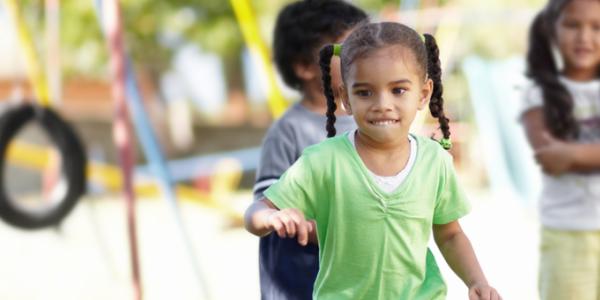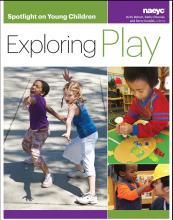Excerpt from Spotlight on Young Children: Exploring Play

Memo to: Infant and Toddler Teachers Everywhere
From: Linda Gillespie and Rebecca Parlakian
Date: January 2015
Subject: Play—The True Work of Childhood
Play is often referred to as a child’s work. As infant and toddler teachers know well, play is a profoundly important medium for learning and development for very young children. Beginning at birth, play unfolds in the context of a responsive, caring adult—that’s you—who sets the stage for exploration by creating a safe base from which babies can explore. Through playful back-and-forth interaction with their important adults, including both family members and teachers, babies learn they are loved, important, and fun to be with. Discoveries made by infants and toddlers lay the foundation for critical social-emotional qualities such as self-confidence, self-esteem, a sense of identity, and the desire to relate to and connect with others— including their peers and favorite adults (like you and your colleagues). Children use these early social-emotional skills to establish and maintain reciprocal relationships all their lives.
Within a loving and supportive relationship, baby’s play unfolds. During play, babies lift, drop, look, pour, bounce, hide, build, knock down, and more. They test key scientific concepts, such as the sounds various objects make when tossed off a high chair tray, and discover the function of objects (to roll, to pop up, or to be stacked). Between birth and age 3, children are developing mathematical concepts, including the concepts all gone, more, and less, and the meaning of one and two. Spatially, babies are experimenting by using shape sorters, nesting cups, and stacking blocks, and trying to fit their bodies into various spaces. They master language and literacy skills as they learn the sounds of their parents’ and teachers’ voices, discover the rules of conversation, and act out stories in dramatic play. All this learning during play is because you and other important adults take the time to respond, set up the environment, plan, and carefully observe babies’ play.
Play is, indeed, the true work of childhood. When we observe carefully, it tells us what children know and what they are thinking about; what they are wondering, testing, and predicting; and, most important, what skills they are ready to master. And then we, as caring teachers, can plan and support their development and learning. Play is a joyful process of testing, learning, and discovery within supportive relationships with parents, teachers, providers, and peers. Play offers a path through which infants and toddlers gain the skills, knowledge, and joy in learning that prove essential to success in school and beyond.
From Spotlight on Young Children: Exploring Play, by Derry Koralek, Holly Bohart, and Kathy Charner. Copyright © 2015 by the National Association for the Education of Young Children.
Learn more about this book
Resources
Recommendations
For Authors & Photographers
Catalog
Webinars
NAEYC Books List
